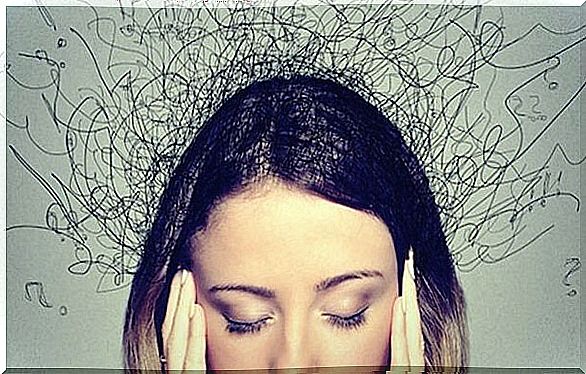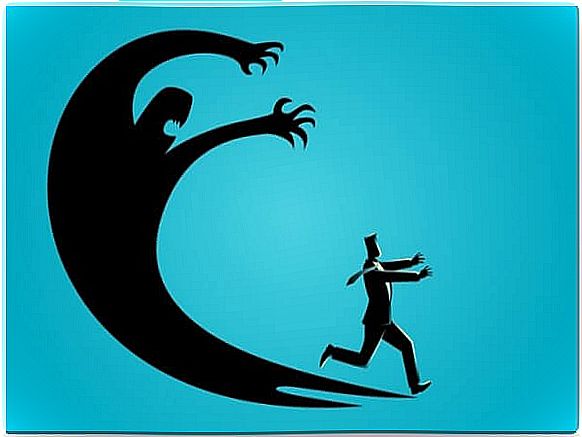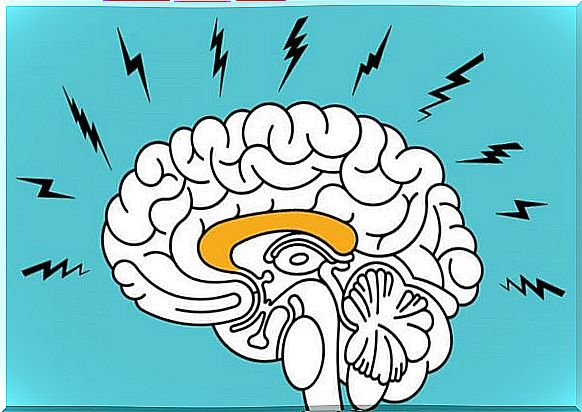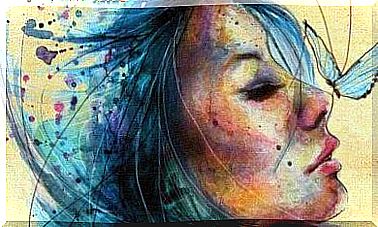The Effect Of Anxiety On The Brain: A Labyrinth Of Exhaustion

The effect of anxiety on your brain is great. Cortisol, adrenaline and noradrenaline put you on guard and in defense. It will not take long for your mind to be taken over by irrational thoughts. Fear will storm in and paralyze you. Other emotions will darken your reality like a cold, moonless night. There are honestly not many other psychological conditions that can be as intense as anxiety.
Demographic studies can tell us a lot, and apparently there are many who live with chronic anxiety. They do not see that there is another way to feel through reality and treat it. They let the raging bull of anxiety whip them around and do not know what to do. But there are also others who have something called situational anxiety. This involves things like talking in public, job interviews, exams, or even interacting with people. These are all things that can make the brain raise its red flag of danger.
We have all had to deal with anxiety at one time or another, it is a natural human response. In the right doses, it can even help push you towards your goals. The problem is that so it so often gets completely out of our control. It does not take long before it takes over your life, sometimes without you realizing it. When that happens, it distorts everything and turns everything into confusion, like a Kandinsky painting.

The effect of anxiety on your brain
If you really want to understand the impact of anxiety on your brain, there is one important thing you need to know first. You need to know how to separate it from stress. For example, stress has to do with a physiological process that starts due to several external factors. In other words, there is always something specific that causes it. There may be pressure at work, too many things to do, problems at home, etc.… It basically appears when you are aware that “you do not have the resources” to handle all these stimuli.
Anxiety, on the other hand, is much more complicated. It may be true that it is often a side effect of stress, but there are also many cases where you experience it without knowing why. It comes from somewhere inside. It’s something that comes up again and again in tough times. It is a physiological response that prepares you to run away from a threat or fight it (whether it is real or not) .
This is what makes anxiety different from stress. It’s also what makes it so much harder to deal with, because of what happens in your brain when you feel it. We’re going to dig deeper into that now.
The amygdala
The amygdala is a small structure at the very back of your brain. It is the part that processes and interprets all sensory signals that come from your environment. It is also the part that alerts your brain when there is a threat, something dangerous to protect you from. It’s basically your instinctive (and occasionally irrational) sensor for common types of fears like spiders, darkness, heights, etc…

Hippocampus
The hippocampus is the part of your brain that is related to emotional memory. If the impact of anxiety on your brain is long lasting and intense, this is one of the parts that will feel the impact the most. It gets smaller, which causes many other serious side effects. Things like memory loss, difficulty concentrating and even post-traumatic stress disorder are all very common with this type of problem. The latter is very common in children who have been abused, with the terrible weight of being constantly scared, anxious and feeling in danger.
In fact, just a few months ago, the journal Neuron published an extremely interesting and hopeful discovery. Researchers found that all the cells responsible for anxiety are actually in the hippocampus. Now they hope to use that finding to develop better medicines to treat this problem.
Cortisol, norepinephrine and adrenaline
Restlessness, alertness, muscle tension and tachycardia are all side effects of a few specific neurotransmitters. The effect of anxiety on your brain comes solely from the unmistakable (and dreaded) combination of cortisol, norepinephrine and adrenaline.
First, your amygdala identifies the danger, and then these neurotransmitters make you react. Your brain wants you to protect yourself by fleeing or reacting in some other way. One way it does this is by pumping more blood into your muscles. It increases the heart rate and sends more air into the lungs.
Of course, this state of alarm can be really useful, as long as the threat is “real”. But when it is not, and you are constantly activating this physiological process, then problems arise. You will begin to have digestive problems, headaches, hypertension, and a risk of cerebrovascular problems.

What you can do about the effects of anxiety on your brain
As we mentioned at the beginning, anxiety is a physiological response. So it is not enough to just say “calm down, everything is going well” to yourself. If your brain determines that there is danger, it will not help you much to reason things out. Therefore, it is important to start with physiological, bodily aspects of things.
- Convince your body that there is no danger. How? Perform relaxing techniques such as deep breathing. Put your body on “pause” so that your brain will calm down as well.
- Make the anxiety work for you. Controlling it is not a problem with willpower. You can not make this psycho-physiological reality disappear from your brain. What you need to do is get through it, and make good use of what it gives you. Artistic therapies are a great way to help you visualize it and actually achieve this. Ceramics and paint are two of the best art forms to give shape to your anxiety. They can turn a devastating monster into a much smaller, less frightening and more manageable creature.
- New habits, new routines. Doing something different in your daily routine has the potential to change everything. Going for a walk, going to a concert every week, meeting new people, signing up for a yoga class… All of these things can change the brain’s alarm system, and make you see things differently.
Finally, do not hesitate to contact a professional if your anxiety takes over. No one deserves to live with fear. No one should have to live forever as a prisoner of a chronic anxiety that makes life so much paler.









